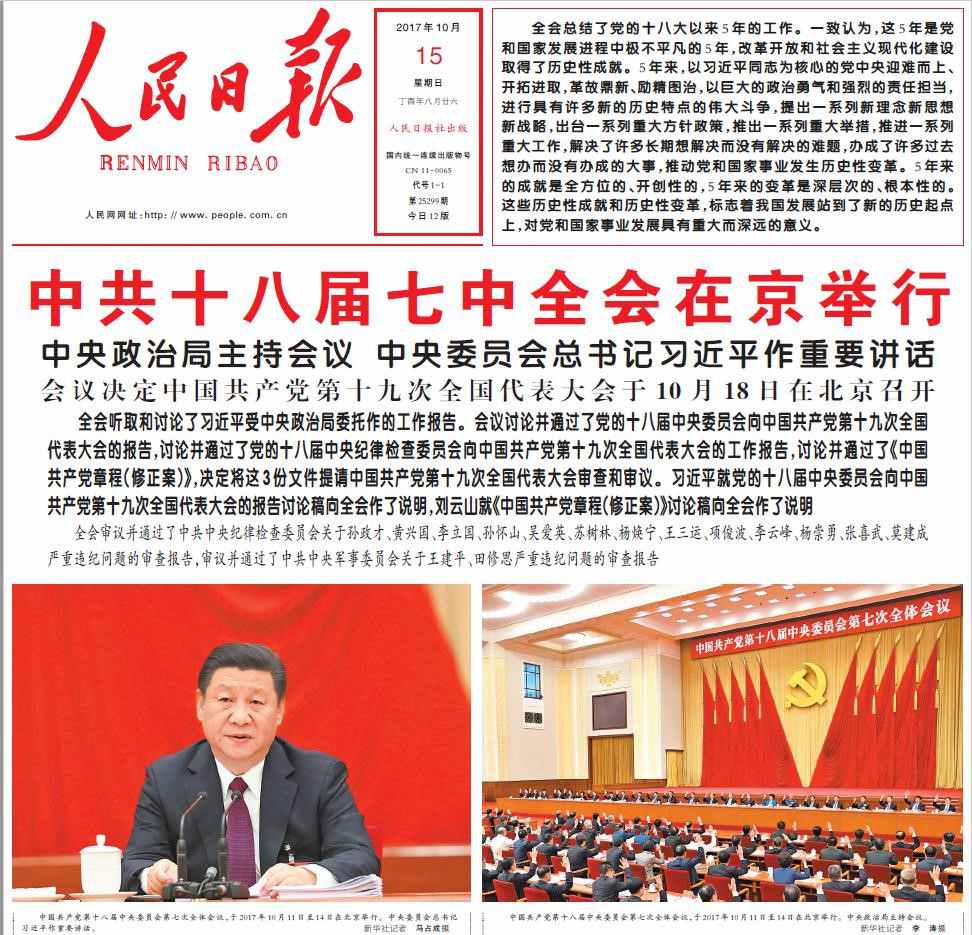


The picture is a screenshot of People’s Daily coverage of the Seventh Plenary Session of the 18th Central Committee of the Communist Party of China (CPC) on October 15. A decision to expel Sun Zhengcai, Huang Xingguo and 10 others from the CPC was endorsed at the plenum.
China has bolstered efforts in its nationwide anti-corruption drive over the past five years and major achievements have been made. Before the 19th National Congress of the Communist Party of China (CPC), the Party is again demonstrating its strong resolution to root out corruption.
On Saturday, the four-day Seventh Plenary Session of the 18th Central Committee of the CPC concluded in Beijing with the issuing of a communique.
The plenum endorsed an investigative report about the severe violations of Party rules of Sun Zhengcai, former member of the CPC Political Bureau and former Secretary of the CPC Chongqing Municipal Committee, Huang Xingguo, former acting Party chief and mayor of Tianjin Municipality, Li Liguo, former minister of civil affairs and another 10 officials. The Political Bureau also made a decision to expel Sun Zhengcai, Huang Xingguo and 10 others from the Party.
The CPC is a a party with more than 89 million members. Without the authority and centralized leadership of the CPC Central Committee and without strict political discipline, rules and a clean political environment, the CPC will compromise its creativity, cohesion and effectiveness, weaken the foundation and ability of its governance and fail its mission, the document said.
Since the 18th Congress, the CPC has adhered to the resolution to fight every corrupt phenomenon and punish every corrupt official including Zhou Yongkang, Bo Xilai, Guo Boxiong, Xu Caihou, Sun Zhengcai and Ling Jihua.
By the end of June, more than 280 centrally-administered officials, 8,600 bureau-level and 66,000 county-level cadres have been investigated by the CPC 18th Central Commission for Discipline Inspection (CCDI).
Meanwhile, a total 40 members and alternate members of the 18th Central Commission and eight members of the CCDI were investigated and punished.
By the end of August, 3,339 fugitives were captured from more than 90 countries and regions. About 9.36 billion yuan ($1.42 billion) was recovered, according to CCDI statistics. Among the top 100 fugitives listed on “red notices” sent to Interpol by China, more than 40 have been arrested.
According to the CCDI, by the end of June, an estimated 1.34 million township-level and 648,000 Party members and officials in rural areas were punished, which has reduced the number of "flies" serving at the grassroots level.
Zhuang Deshui, deputy director of the Research Center for Government Integrity-Building at Peking University, said the battle against corruption has gained crushing momentum and the spread of corruption has been effectively contained after the 18th National Congress of the CPC.
In the past five years, the CPC Central Committee has formulated or revised nearly 80 Party regulations following the enactment of the eight-point frugality code and has basically formed a system of Party rules and regulations including Guidelines on Honesty and Self-Discipline, Rules on Disciplinary Actions and documents regarding the Party's inspection work.
China started the efforts to reform the state supervisory system at the end of 2016. The three pilot supervisory system reforms in Beijing, Shanxi and Zhejiang have made real progress with the establishment of local supervisory commissions at three levels – provincial, municipal and county – completed. An integrated supervision system under the leadership of the CPC will come out to cover all public officials.
Robert Lawrence Kuhn, a political and economic commentator as well as an international corporate strategist, said Chinese President Xi Jinping’s unprecedented anti-corruption campaign has won strong public support.
Xi’s determination to root out corruption and cut the wasteful and detested perks of officialdom is altering how officials in government, and executives in State-owned enterprises, work and even think, Kuhn said.

 Award-winning photos show poverty reduction achievements in NE China's Jilin province
Award-winning photos show poverty reduction achievements in NE China's Jilin province People dance to greet advent of New Year in Ameiqituo Town, Guizhou
People dance to greet advent of New Year in Ameiqituo Town, Guizhou Fire brigade in Shanghai holds group wedding
Fire brigade in Shanghai holds group wedding Tourists enjoy ice sculptures in Datan Town, north China
Tourists enjoy ice sculptures in Datan Town, north China Sunset scenery of Dayan Pagoda in Xi'an
Sunset scenery of Dayan Pagoda in Xi'an Tourists have fun at scenic spot in Nanlong Town, NW China
Tourists have fun at scenic spot in Nanlong Town, NW China Harbin attracts tourists by making best use of ice in winter
Harbin attracts tourists by making best use of ice in winter In pics: FIS Alpine Ski Women's World Cup Slalom
In pics: FIS Alpine Ski Women's World Cup Slalom Black-necked cranes rest at reservoir in Lhunzhub County, Lhasa
Black-necked cranes rest at reservoir in Lhunzhub County, Lhasa China's FAST telescope will be available to foreign scientists in April
China's FAST telescope will be available to foreign scientists in April